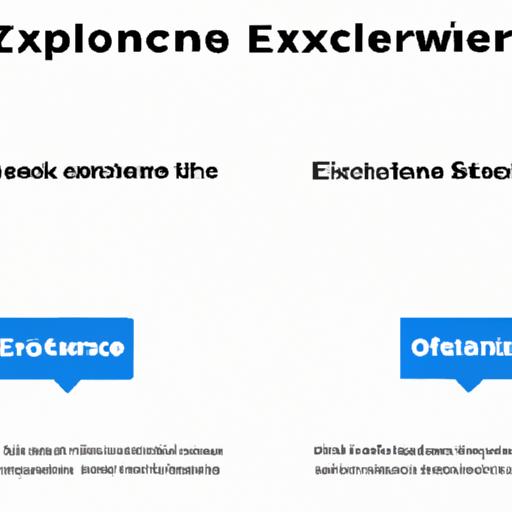
Introduction
In the vast realm of online communities and knowledge-sharing platforms, two prominent names stand out: Stack Exchange and Stack Overflow. These platforms serve as hubs for individuals seeking answers to their burning questions, connecting with experts, and delving into a world of collective wisdom. Understanding the nuances and disparities between Stack Exchange and Stack Overflow is crucial for navigating the digital landscape effectively.
As we embark on this exploration, we will uncover the unique features, functionalities, and user dynamics that distinguish Stack Exchange from Stack Overflow. Join me as we unravel the intricacies of these platforms and unlock the key differences that shape their identities in the online ecosystem. Let’s dive in and shed light on the distinctive characteristics that set Stack Exchange and Stack Overflow apart.
Stack Exchange: Overview
What is Stack Exchange?
Stack Exchange is a network of question-and-answer websites covering a wide range of topics, from technology and programming to cooking and photography. It serves as a platform where users can ask questions, provide answers, and engage in discussions within specific communities known as “Stack Exchange sites.”
Purpose and Goals of Stack Exchange
The primary goal of Stack Exchange is to create a community-driven platform where individuals can seek knowledge, share expertise, and collaborate with like-minded enthusiasts. By fostering a culture of mutual assistance and learning, Stack Exchange aims to build a repository of high-quality information that benefits both users and the broader online community.
How it Differs from Other Q&A Platforms
Unlike traditional question-and-answer forums, Stack Exchange places a strong emphasis on quality, relevance, and expertise. Through a reputation system and moderation tools, Stack Exchange strives to maintain a high standard of content while encouraging users to contribute meaningfully to discussions. This focus on quality control sets Stack Exchange apart from other Q&A platforms, ensuring that users receive accurate and reliable information from trusted sources.
Stack Overflow: Overview
Explanation of Stack Overflow
Stack Overflow, founded in 2008, is a question and answer website catering primarily to programmers and developers. It serves as a platform for individuals to seek solutions to coding-related queries, troubleshoot technical issues, and engage with a vibrant community of fellow developers. With a vast repository of knowledge encompassing various programming languages and technologies, Stack Overflow has become a go-to resource for professionals and enthusiasts in the tech industry.
Purpose and Goals of Stack Overflow
The primary goal of Stack Overflow is to provide a collaborative space where individuals can share their expertise, learn from others, and contribute to a collective pool of programming knowledge. By fostering a community-driven approach to problem-solving, Stack Overflow empowers users to leverage the collective intelligence of its members to tackle complex challenges, refine their skills, and stay abreast of the latest trends in the ever-evolving tech landscape.
How Stack Overflow Differs from Stack Exchange
While Stack Exchange comprises a network of diverse Q&A sites spanning a range of topics beyond programming, Stack Overflow maintains a singular focus on programming and software development. The specialized nature of Stack Overflow caters specifically to the needs of developers, offering a tailored experience that prioritizes technical discussions and solutions within the realm of coding. This targeted approach sets Stack Overflow apart from the broader scope of Stack Exchange, emphasizing its niche expertise and dedicated community of programming enthusiasts.
Key Differences between Stack Exchange and Stack Overflow
Community and User Base
When comparing Stack Exchange and Stack Overflow, one of the primary distinctions lies in their respective communities and user bases. Stack Exchange caters to a diverse range of topics and interests, attracting users from various fields and industries. On the other hand, Stack Overflow is renowned for its focus on programming and technology-related queries, drawing in a specialized audience of developers and tech enthusiasts. Understanding the demographics and interests of each platform’s user base is essential for engaging effectively with the community.
Types of Questions and Topics
Another critical contrast between Stack Exchange and Stack Overflow is the types of questions and topics that dominate each platform. While Stack Exchange hosts a wide array of subjects, including but not limited to science, arts, and humanities, Stack Overflow predominantly revolves around programming languages, software development, and technical troubleshooting. The specificity of the topics covered on each platform influences the nature of discussions and the expertise required to participate actively.
Reputation and Ranking System
In the realm of online communities, reputation and ranking systems play a pivotal role in incentivizing user engagement and rewarding contributions. Stack Exchange and Stack Overflow employ distinct mechanisms for evaluating user contributions and assigning reputation points based on the quality and relevance of their interactions. Understanding how these systems operate can help users gauge their standing within the community and strive towards building credibility and recognition.
Moderation and Guidelines
Maintaining a healthy and constructive community environment relies heavily on effective moderation and clear guidelines for user conduct. Stack Exchange and Stack Overflow uphold specific rules and protocols to ensure respectful interactions, adherence to posting guidelines, and the overall integrity of the platforms. Familiarizing oneself with the moderation practices and community guidelines of each platform is essential for navigating discussions, resolving conflicts, and contributing positively to the community.
Pros and Cons of Stack Exchange and Stack Overflow
Benefits of Using Stack Exchange
When it comes to Stack Exchange, one of the key advantages lies in its diverse range of communities catering to specific topics and interests. This specialized approach allows users to delve deep into niche areas and connect with like-minded individuals who share their passion and expertise. Additionally, the reputation system on Stack Exchange incentivizes quality contributions and fosters a sense of community and accountability among users.
Benefits of Using Stack Overflow
On the other hand, Stack Overflow shines in its vast user base of developers and tech enthusiasts, making it a go-to platform for programming-related queries. The robust search functionality and tagging system on Stack Overflow streamline the process of finding relevant information quickly. Moreover, the upvoting and acceptance of answers on Stack Overflow ensure that the most helpful responses rise to the top, providing users with valuable insights and solutions.
Drawbacks of Each Platform
Despite their strengths, both Stack Exchange and Stack Overflow have their drawbacks. Stack Exchange’s stringent guidelines and moderation policies can sometimes lead to overly strict enforcement and hinder open discussions. On the other hand, Stack Overflow’s sheer volume of content can be overwhelming, making it challenging for users to sift through and find accurate information. Balancing the benefits and drawbacks of each platform is essential for users to make informed decisions based on their specific needs and preferences.
Conclusion
As we draw the curtains on our comparison between Stack Exchange and Stack Overflow, it becomes evident that each platform offers a unique set of advantages and drawbacks. Stack Exchange shines as a diverse community catering to a wide array of topics, fostering in-depth discussions and niche expertise. On the other hand, Stack Overflow’s laser focus on programming and technical queries makes it a go-to destination for developers worldwide.
In conclusion, the choice between Stack Exchange and Stack Overflow ultimately boils down to your specific needs, preferences, and the nature of your queries. Whether you seek a broad spectrum of knowledge or targeted technical assistance, both platforms have their merits. By understanding the nuances and distinctions outlined in this article, you can make an informed decision on which platform aligns best with your requirements. Embrace the wealth of insights available on Stack Exchange and the technical prowess of Stack Overflow to elevate your online learning and problem-solving experiences.

